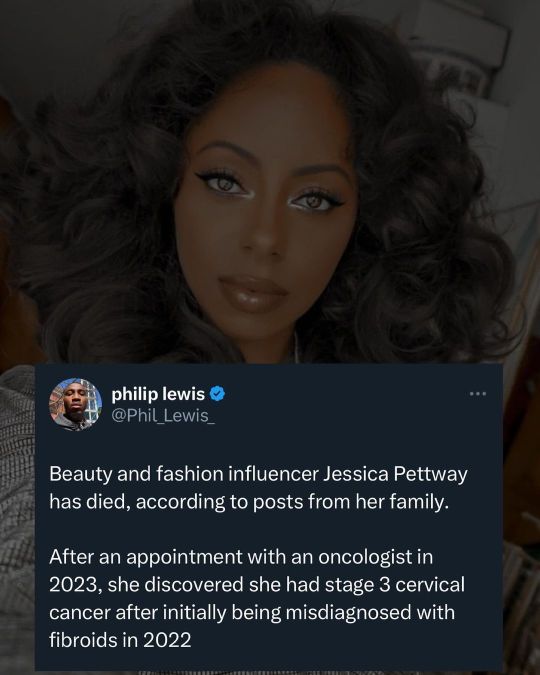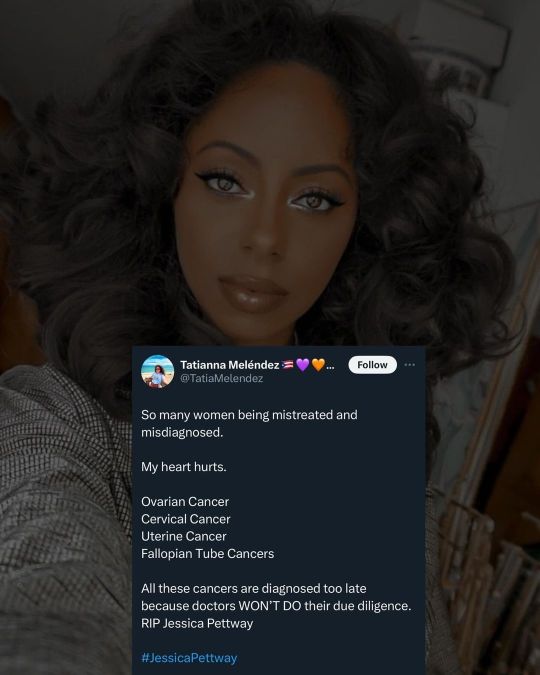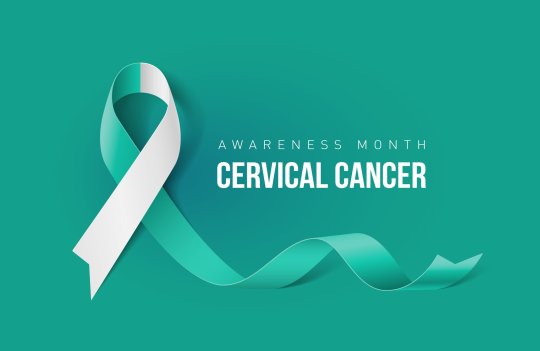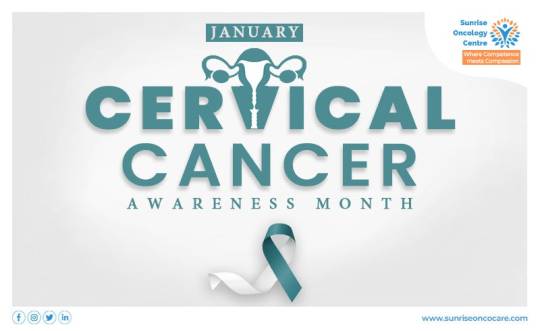#Cervical Cancer awareness
Explore tagged Tumblr posts
Note
Hello! I’ve been so ill this past few weeks and been hospitalized because of medical concerns. Found out that I have a tumor and it was already malignant. I have a Stage 2A Cervical Cancer and needs help ASAP. 🥺
GOAL: $1800

I don't have any money to spare sadly, but I made this drawing to bring awareness to cervical cancer. I hope that you can get the money you need for treatment!
#art#artists on tumblr#digital art#cervical cancer#cervical cancer awareness#i dont know what else to tag this
2 notes
·
View notes
Text
Graduate College and Lions Club Jamshedpur Conduct Health Awareness Program on Cervical Cancer
Dr. Ritika Kedia educates students on cervical cancer prevention and treatment at Graduate College. Graduate College’s NSS unit and Lions Club Jamshedpur Steel City organized a health awareness program on cervical cancer. JAMSHEDPUR – On 08/08/2024, Graduate College’s NSS unit, in collaboration with Lions Club Jamshedpur Steel City, conducted a health awareness program on cervical cancer at the…
#आयोजन#Cancer Prevention#cervical cancer awareness#Dr. Ritika Kedia#early detection#Event#Graduate College#health program#Jamshedpur events#Lions Club Jamshedpur#NSS unit#student health
0 notes
Text
Cervical Cancer: 5 Early Warning Signs!
Cervical cancer is a highly preventable disease when identified and treated early. This article is titled: Cervical Cancer: 5 Early Warning Signs! empowers women with knowledge about five key warning signs to watch for, explores the causes of cervical cancer, and provides actionable prevention tips, all backed by scientific evidence. Cervical Cancer: 5 Early Warning Signs! What is Cervical…

View On WordPress
#Cervical cancer awareness#cervical cancer causes#cervical cancer prevention#Cervical cancer symptoms#Early detection#early signs of cervical cancer#Warning signs#Women&039;s health
0 notes
Text
Cervical cancer is a preventable and treatable disease when detected early through regular screening and prompt medical intervention. With the expertise of Dr. Usha M Kumar, one of the leading Cervical Cancer Surgeons in Delhi, women can receive comprehensive and compassionate care for cervical cancer, ensuring the best possible outcomes for their health and well-being. By raising awareness of the signs and symptoms of cervical cancer and advocating for regular screening, we can work together to reduce the burden of this disease and improve the lives of women everywhere.
0 notes
Text
Affecting women worldwide, cervical cancer ranks among the leading causes of female mortality. To combat this, groundbreaking preventive measures like Human Papillomavirus (HPV) vaccines have emerged. Let’s delve into the most common inquiries about Cervical Cancer Vaccine – HPV vaccines, exploring their science, benefits, and transformative impact on cervical cancer.
0 notes
Text
CHAT study: Cervical Cancer Prevention in Trans and Non-binary people with vulvas
Help Mathematica advance knowledge about the health of trans and gender-diverse populations!
This survey is designed to gather data necessary to broaden cervical cancer prevention and screening research to include transgender and gender-diverse people. To be eligible to participate in the survey, respondents must live in the U.S., Brazil, or Germany; be 25 years of age or older; be assigned female at birth; identify as trans, nonbinary, intersex, genderfluid, genderqueer, or agender; and have a cervix. Eligible respondents who complete the survey will each receive a $10 gift card.
Please share with your networks!
https://cit1.mathematica-mpr.com/wix/01/p1161851.aspx
#Trans health#Nonbinary#Health study#Genderqueer#Intersex#Cervical Cancer awareness#Cancer Prevention#LGBT health
0 notes
Text







#jessica pettway#cervical cancer#misdiagnosis#beauty influencer#youtube#stage 3#cancer awareness#health#women's health#fibroids#cancer diagnosis#grief#mourning#bias in medicine#medical bias
342 notes
·
View notes
Text

43 notes
·
View notes
Text
Hi Everyone, please reblog and share this everywhere that you can!! I feel like my whole world is crumbling right now and honestly, I don't know what I would do without her here. Please, if anyone can donate anything at all, It would be beyond appreciated 🙏🏻 ❤
#my posts#lgbtq#witch#mom#cancer awareness#cervical cancer#neuroendocrine#stray kids#taylor swift#cottagecore#twitter#pokemon#travel#undertale#halloween#autumn#pagan#wicca#youtube#marvel#gay#music#aesthetic#love
3 notes
·
View notes
Photo

HPV awareness and education is the key for preventing various HPV-related cancers. One of them is cervical cancer, a disease that kills thousands of women every year. Being a virus-borne infection, HPV infections are communicable that can travel among people through skin-to-skin contact (sexual intercourse). There are over 100 strains of HPV, more than 40 of which are passed through sexual contact and can affect your genitals, mouth, or throat. Genes2Me HPV-Q Comprehensive Real-Time PCR kit screens for the presence/absence of HPV in genotypes. Take the test today to determine your risk of HPV.
For more details, Call us at 18001214030 or drop us an email at [email protected] for an Appointment
To know more visit https://t2m.io/HPVKits
#HPV#Awareness#Cancer#cervicalcancer#Appointment#Cervical#treatment#rtpcr#kits#test#testing#healthcare#health#genetics#pcr#virus#education#genes2me#g2m#sequencing#Disease
4 notes
·
View notes
Text
[Image description: simplified scientific diagram of internal reproductive system (ovaries, fallopian tubes, uterus, etc., with an addition of a box drawn around the cervix (area at the top of the vagina and bottom of the uterus) with a thick black arrow pointing towards it with the caption "This Thing". End image description.]
Also going to add a couple of things of my own: 1. Discovering that I could ask for a smaller speculum was a MASSIVE game-changer for me. I recommend this wholeheartedly. 2. In the UK, it's generally one of the specialist nurses at your GP clinic that provide the service, and it's very easily booked and accomplished. 3. I am feeling very angry now because I've been prevented, time and again, from getting the HPV vaccine because I was "too old" and now it turns out that a couple of years ago I still wasn't.
Attn: People With Cervixes!

When was your last Pap smear?
Because I am tired of seeing young people (think 40 year olds!) die horribly of an almost completely preventable disease, and I haven't seen the obligatory Tumblr PSA about it, so I'm making my own.
1. CERVICAL CANCER IS REALLY BAD
Cancers that have a good prognosis are usually cancers that can be caught early--like skin cancer, which is easily seen, and therefore usually treated very early. Cervical cancer does not give you symptoms until you have very advanced disease, which means unless someone is regularly testing your cervix, you will likely not be diagnosed early. More than half of people diagnosed with cervical cancer present with advanced disease. 75% of them will be dead within 5 years. For comparison, when caught in the earliest stage, there is a 90% 5 year survival rate. Treatment for those diagnosed is chemo and radiation, and believe me, those are not fun. If you do happen to be in the lucky 25% of survivors, if your cancer comes back, you have an 85% chance of dying within a year. Also! We think of cancer as something that happens to old people, but the average age of diagnosis for cervical cancer is 50.
2. WHO GETS CERVICAL CANCER?
Cervical cancer used to be the most common cause of cancer-related death in women in America, but at this point it's basically a disease of People Without Pap Smears--developing countries, immigrants, low socioeconomic status, BIPOC, rural communities, LGBTQ, etc.
3. HOW DO PAP SMEARS SAVE YOUR LIFE?
A Pap smear is a screening test for two things: HPV, and your cervical cells. HPV is the most common sexually transmitted disease in the world. Literally half of the people in America have some strain of HPV on their body. Most HPV infections go away on their own (in people with healthy immune systems), but some strains are Very Bad, and some people are just Very Unlucky, and the HPV starts causing your cervical cells to turn cancerous. 91% of all cervical cancers are caused by HPV. So a Pap smear looks to see if your have HPV, and if so, is it one of the bad ones? And also, do you have any cancerous cells hanging about in your cervix? And! It takes 10-30 years for HPV to turn those cells into cancer, which means you have a really really long time to catch it before it becomes cancer and cut those pre-cancer cells out!
4. WHAT ABOUT THAT VACCINE?
The thing my dad said I shouldn't get because it might make me a slut. Yes! There is an HPV vaccine! You should get it! It protects you against the nine most common cancer-causing types of HPV. It's recommended starting at age 11, and you can get it up to age 45 now! (It used to be 26, but as of 2020, it's now extended.)You can get it from most primary care doctors, or from Planned Parenthood, CVS, Walgreens, etc. If you get the vaccine you still need Pap smears.
5. I HEARD YOU CAN ONLY GET THE VACCINE IF YOU'RE A VIRGIN
Fake news. While the vaccine does not treat old infections of HPV, it does prevent new ones, so while the benefits are theoretically decreased in those who have already been sexually active, it does not mean you will not benefit from having it!
6. WHO GETS PAP SMEARS?
Everyone with a cervix starting at age 21, until you lose your cervix or until you're 65. You should get them every 3-5 years (depending on your exact age and what test your doctor does).
7. BUT I GOT THE VACCINE
Nice! You still need Pap smears.
8. I HAD ONE AND IT WAS HORRIBLE/I'M SCARED OF THE EXAM
Talk to your doctor about this in advance! Good gynecologists (and other providers) will work with you to minimize discomfort as much as possible. They can use a small speculum and lots of gel, prescribe anti-anxiety medications to take in advance, and some people will even use numbing creams and/or laughing gas.
9. BUT I DON'T HAVE/CAN'T SEE A GYN
Most primary care physicians can do them! So do a lot of urgent care centers!
10. BUT I'M A LESBIAN
HPV can be transmitted through oral/genital contact, hand/genital, and even hand-to-hand-then-genital, so you still need Pap smears.
11. BUT I'M A VIRGIN/ASEXUAL
You still need Pap smears. HPV can be transmitted not just through penetrative sex, but also through oral/genital, hand/genital, and hand-to-hand-then-genital, and also 9% of cervical cancers are not caused by HPV.
12. BUT I'M A TRANSGENDER MAN
If your cervix was removed, then congrats! You do not need Pap smears. Otherwise, unfortunately, you are still at risk for cervical cancer and need to be screened.
13. BUT I'M A TRANSGENDER WOMAN
Neovaginas do not need Pap smears! Congrats! Consider getting the vaccine, though, to prevent spreading HPV to others.
14. BUT I'M A CIS-GENDERED MAN
Congrats! You do not need Pap smears! You should still consider the vaccine though, not only to prevent the spread of HPV to others, but also because HPV causes 50% of all penile cancers as well.
In summary: please please please go get your pap smear. Go get vaccinated. The spread of HPV can be prevented, and cervical cancer can be caught and treated before it even becomes cancer.
DON'T FEAR THE SMEAR
#cervical cancer#reblog for awareness#image#image description#cancer#cancer awareness#prevention#please don't let fear or shame stop you from looking after your health#health advice#oca
57K notes
·
View notes
Text
Inner Wheel Club Launches Cervical Cancer Awareness Campaign in Jamshedpur
Local Organization Promotes Prevention and Vaccination Among Young Girls Jamshedpur’s Inner Wheel Club spearheads an initiative to educate youth about cervical cancer risks and prevention methods. JAMSHEDPUR – The Inner Wheel Club of Jamshedpur has initiated a health awareness campaign focused on cervical cancer prevention among young girls in the city. President Sarika Singh led the organization…
#आयोजन#Cancer Prevention#cervical cancer awareness#Event#Inner Wheel Club#Jamshedpur#Sarika Singh#vaccination campaign#youth health
0 notes
Text
This Gynecologic Cancer Awareness Month

This Gynecologic Cancer Awareness Month, Stand Up for Women’s Health by Educating Others and Encouraging Preventive Care
Visit: www.sunriseoncocare.com
Our centres: Borivali, Chembur, Goa, Khar, Prabhadevi, Thane, Vasai
#borivali#cancer hospital#cancer screening#doctor opinion#cancer specialist#sunrise oncology centers#mumbai#chembur#maharashtra#andheri#ovarian cancer#ovariancancertreatment#breast cancer#cancer awareness#cervical cancer
0 notes
Text
Tips to Prevent and Spot Cervical Cancer Early!

Cervical cancer is one of the most common cancers affecting women worldwide. Yet, many women remain unaware of its risks, symptoms, and preventive measures. What if you could reduce your chances of developing this disease significantly just by being informed and proactive? The good news is that with early detection and prevention strategies, you can empower yourself and others to take control of their health. In this article, we’ll explore how to prevent and detect cervical cancer early, making it easy for you to stay informed.
What is cervical cancer?
Cervical carcinoma originates in the cells of the cervix. The primary cause of cervical carcinoma is persistent infection due to human papillomavirus (HPV). Not all HPV infections lead to cancer, but certain strains can cause changes in cervical cells over time, leading to cancer if left untreated. Understanding this relationship is crucial for prevention, as it highlights the importance of vaccination and regular screenings.
What are the early warning signs of cervical cancer?
Cervical cancer typically progresses gradually and may not present symptoms in its early stages. However, as it advances, certain warning signs may become noticeable, such as:
Unusual Bleeding: This could be bleeding between periods, after intercourse, or after menopause.
Pelvic Pain: If there is a chronic pelvic pain, it can indicate a more serious issue.
Unusual Discharge: Changes in vaginal discharge, particularly if it is watery, pink, or foul-smelling, should not be ignored.
Pain During Intercourse: If you experience pain during sex that is new or worsening, it’s essential to consult a healthcare provider.
While these signs may not necessarily indicate cervical cancer, they warrant further investigation.
How can you prevent cervical cancer?
Prevention is your first line of defence against cervical cancer. Here are few methods you can adopt:
Get Vaccinated: One of the most powerful tools against cervical cancer is the HPV vaccine. The Cervavac injection is a notable option, providing protection against the most common strains of HPV linked to cervical cancer. Vaccination can majorly decrease the risk of developing HPV-related cervical cancer, especially when given before the onset of sexual activity.
Regular Screenings: Routine Pap tests and HPV tests are crucial for early detection. Such tests can identify abnormal cells in the cervix before they develop into cancer. It’s generally recommended to start screening at age 21 and continue every three years until age 29. For women between 30 to 65 of age, a Pap smear test combined with an HPV test every five years is often advised.
Safe Sex: Using condoms and reducing the number of sexual partners can minimize the risk of HPV infection. While condoms don’t completely eliminate the possibility of contracting HPV, they significantly lower the risk.
Avoid Smoking: Smoking weakens the immune system, which in turn make it harder for the body to fight off infections, including HPV. Quitting smoking can improve your overall health and reduce the risk of cervical cancer.
Stay Informed and Educated: Knowledge is power. Staying informed about cervical cancer, its risks, and prevention methods can empower you to take proactive steps toward your health.
What should you include in your cervical cancer diet?
A healthy meal can play a role in cancer prevention, including cervical cancer. Here are some dietary tips to consider:
1. Fruits and Vegetables
Focus on including a variety of vibrant fruits and vegetables in your meals. These colourful foods are packed with antioxidants and vital vitamins that play a key role in strengthening your immune system.
2. Whole Grains
Brown rice, quinoa, and whole wheat products are good for your health. These grains are excellent sources of fibre and essential nutrients that contribute to overall health.
3. Lean Proteins
Choose lean protein options like chicken, fish, and legumes. These are important for building and maintaining a healthy body while also supporting immune function.
4. Healthy Fats
Eat healthy fats from sources such as avocados, nuts, and olive oil. These fats are beneficial for your overall health and can promote well-being.
5. Minimise Processed Foods
Avoid eating processed and sugary foods. Reducing these items can help you keep a normal healthy weight and reduce your chances of getting cancer.
What lifestyle changes can lower your risk?
In addition to dietary changes, there are several other ways you can adopt to reduce your risk of cervical cancer:
Healthy Weight: Obesity is linked to various cancers, including cervical cancer. Regular exercise and a balanced meal can help you maintain a healthy weight.
Stress: It can weaken the immune system. Engage in stress-reducing activities like yoga, meditation, or spending time in nature.
Alcohol Consumption: Drinking alcohol in moderation is advisable, as excessive consumption can increase cancer risk.
Final thoughts
Being proactive about your health is the best way to prevent and detect cervical cancer early. By understanding the risks, recognising the warning signs, and adopting good healthy habits, you can reduce your chances of developing this disease. Remember, regular screenings and vaccinations are crucial tools in your prevention arsenal. Don’t hesitate to discuss any issues you experience with your doctor; they are there to help you navigate your health journey. Your awareness and action can make all the difference in protecting yourself from cervical cancer.
0 notes
Text
instagram
#aurawomen#aura#fertility#ivf#infertility#iui#pregnancy#ivfsuccess#maternity#iuisuccess#cervical cancer#cervicalcancertreatment#pcos awareness#understanding#cervical#cancer#Instagram
1 note
·
View note
Text
Cervical Cancer Awareness Month

Understanding Cervical Cancer: Cervical cancer originates in the cervix, comprising the ectocervix and endocervix, where most cancers begin. Squamous cell carcinoma and adenocarcinoma are the primary types, with the former being more prevalent.
Signs and Symptoms: Identifying cervical cancer early is challenging due to its asymptomatic nature. However, symptoms such as abnormal vaginal discharge, pelvic pain, and vaginal bleeding may indicate its presence.
Risk Factors: Several factors, including weakened immune systems, smoking, multiple sexual partners, and early sexual activity, increase susceptibility to cervical cancer by fostering HPV infections and cervical cell alterations.
Complications: cervical cancer include metastasis, fertility issues, and side effects from treatments like surgery, chemotherapy, and radiotherapy.
Prevention Strategies: Preventive measures like HPV vaccination, limiting exposure to HPV, condom use, smoking cessation, and regular cervical cancer screening can significantly reduce the risk of developing cervical cancer.
Cervical Cancer Awareness Month: Observed annually in January, this month serves to educate the public about the early signs and symptoms of cervical cancer, promoting early detection and intervention to save lives.
Increased awareness and education about cervical cancer can lead to early detection, reducing mortality rates and improving overall outcomes.
To read the full article by clicking here
Or
Or visit our website by clicking here
#cancer#cancer treatment#cancer care#cervical cancer#cervical pain treatment#cervical cancer awareness month#sunrise oncology center#cervical cancer symptoms
0 notes